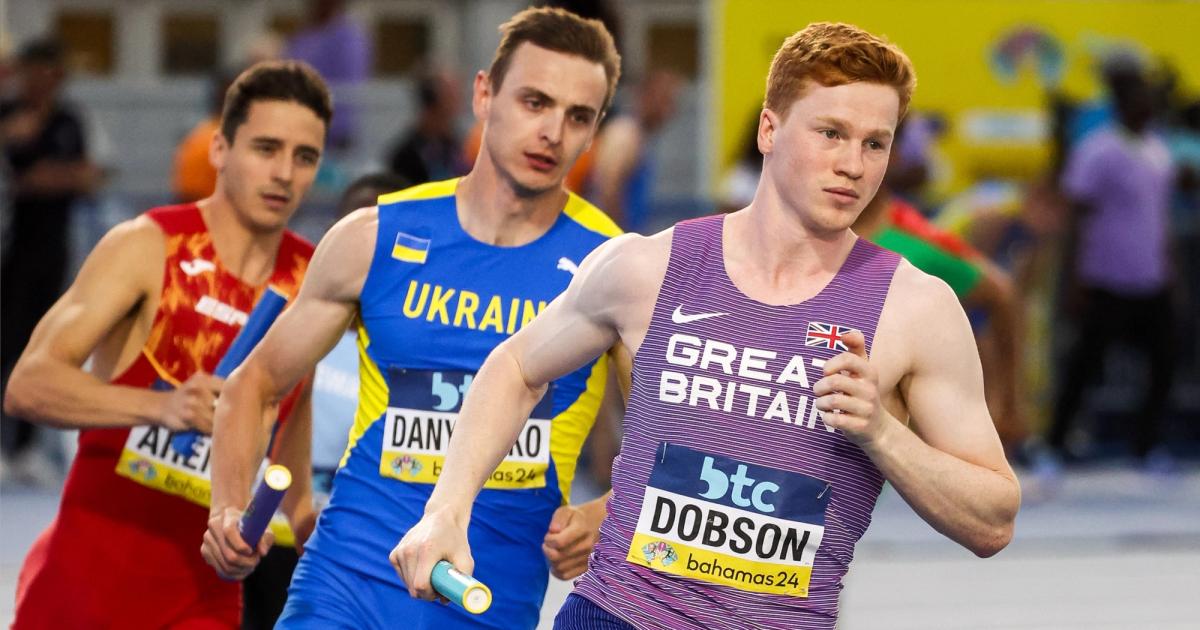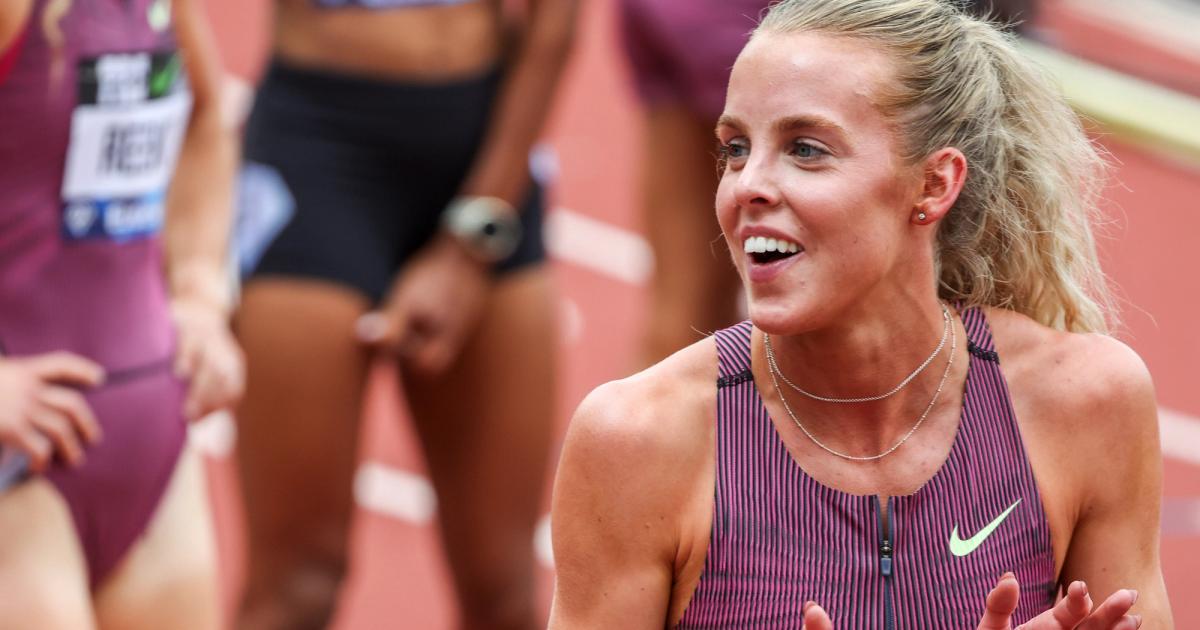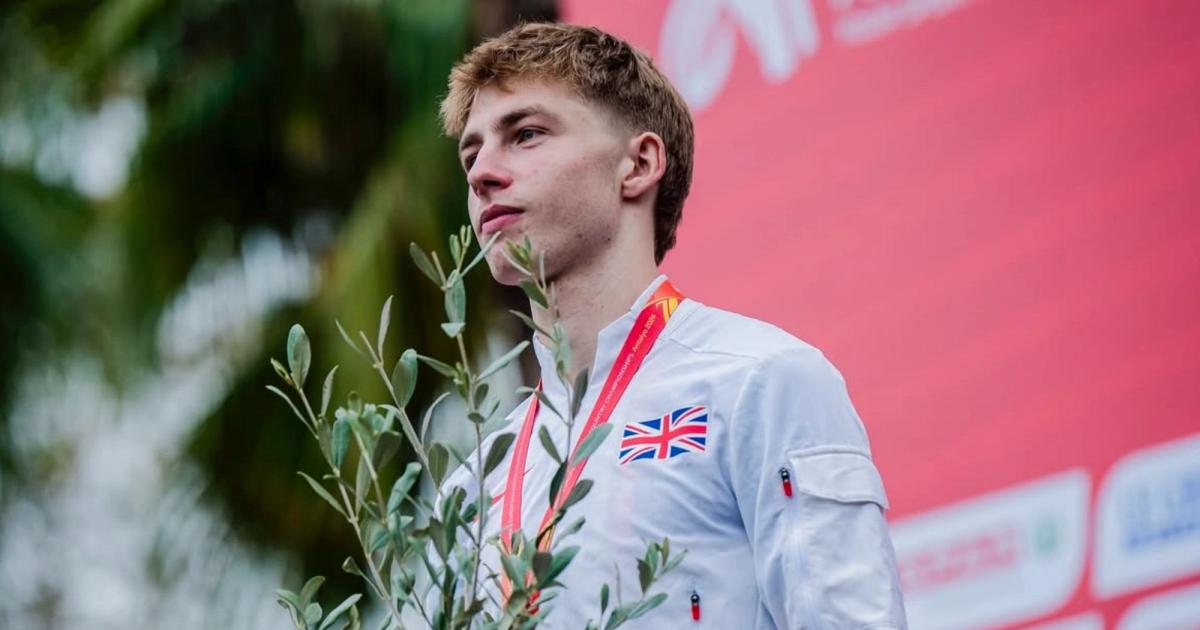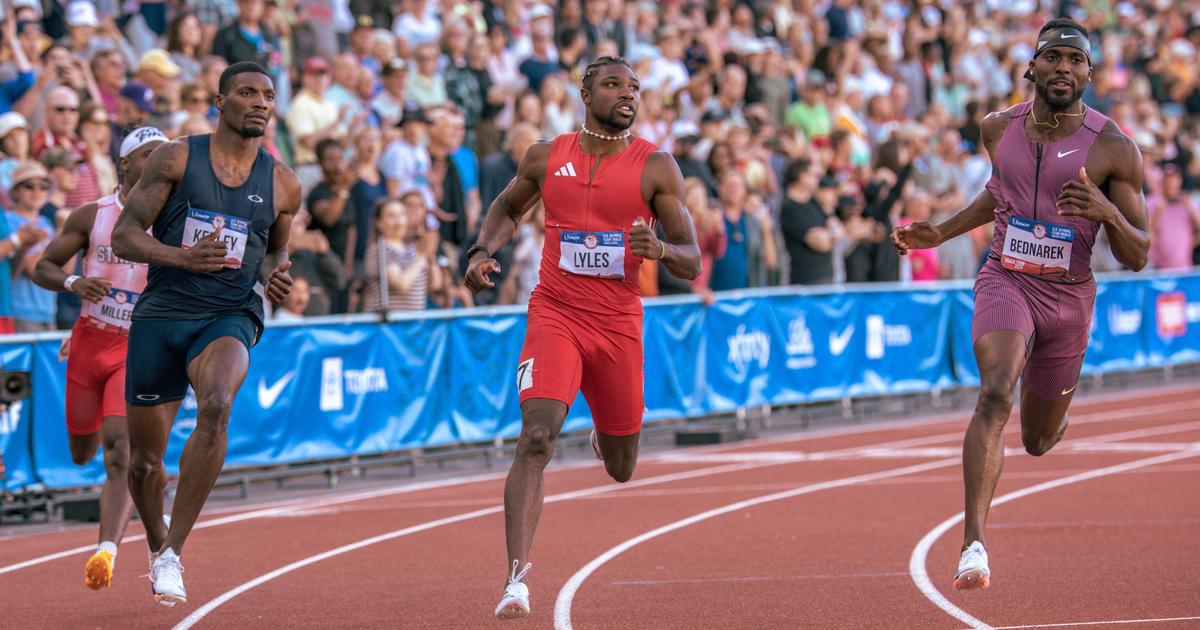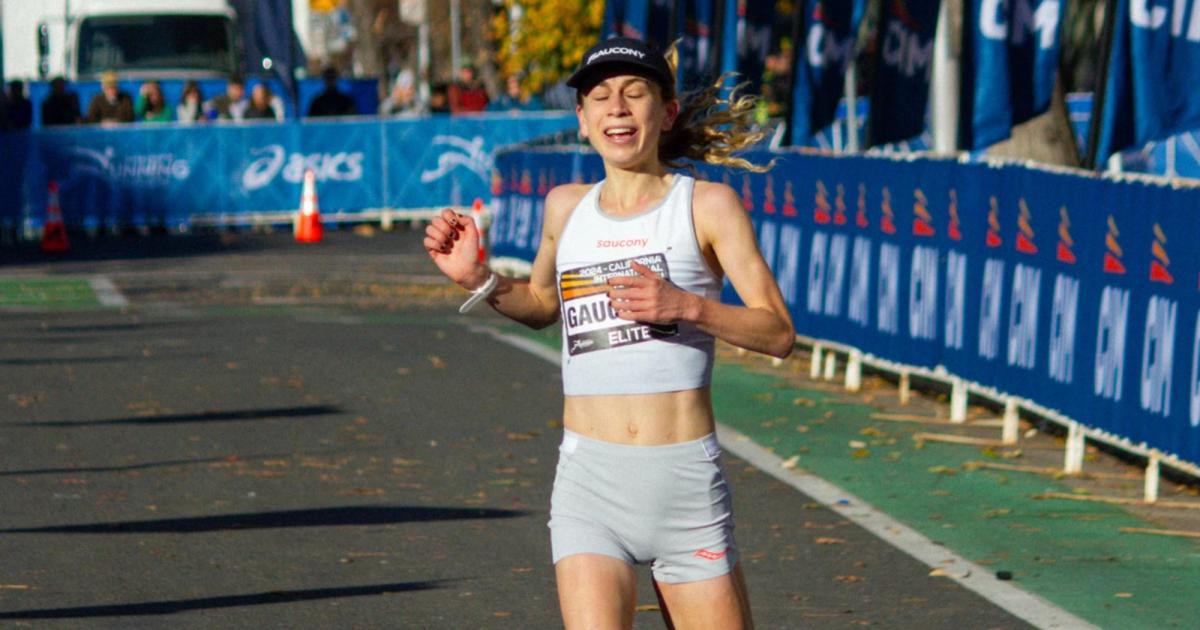By Preet Majithia
January 30, 2025
Charlie Dobson, a 25-year-old British 400m runner, popularly known as the “ginger ninja,” had a breakout year in 2024, transitioning from being a 200m sprinter to doing the 400m full-time with a great deal of success. He notably had a front row view for the epic battle between Letsile Tebogo and Rai Benjamin in the 4x400 meter final in Paris and secured the bronze medal for Team GB with a 43.33s split of his own.
Dobson boasts a 44.23 personal best, was an Olympic semi-finalist individually, and was the European silver medalist in Rome earlier in the summer. He capped off his season by becoming the Diamond League Champion in Brussels in September. He joined Preet Majithia for CITIUS MAG in early November of 2024 to discuss his incredible year, his training setup, his hopes for the upcoming 2025 season, as well as exploring why the 400m has gone absolutely nuts lately.
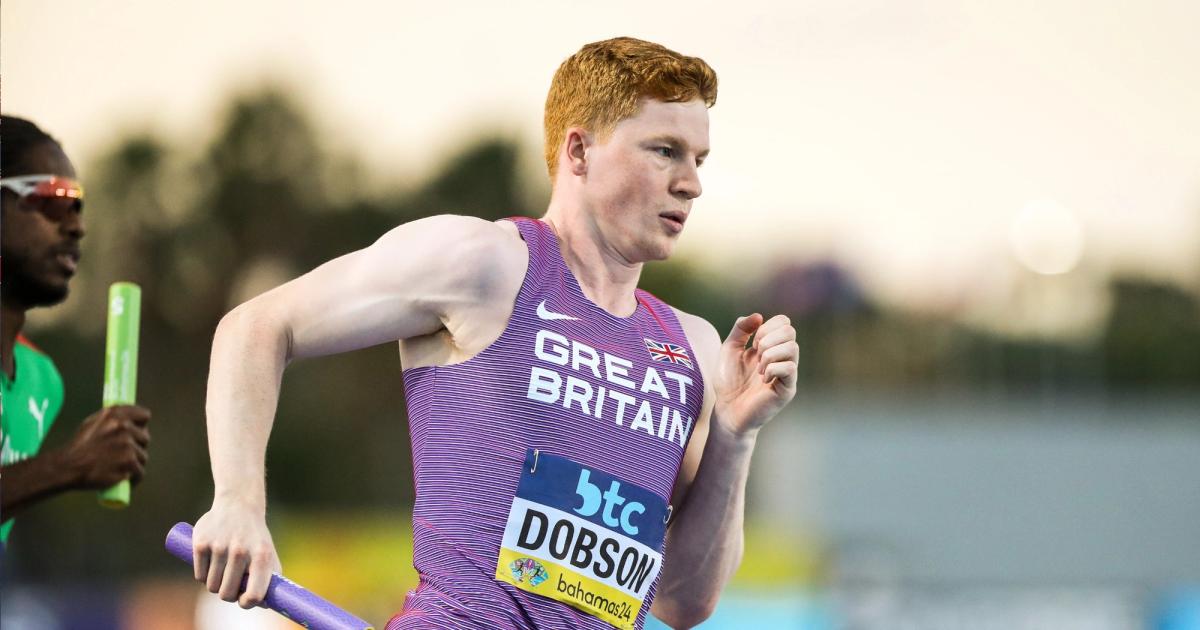
Kevin Morris / @kevmofoto
This interview has been edited for length and clarity.
Preet Majithia: In 2023 you picked up 4x400m bronze at the World Championships with the British relay team, and you came into 2024 with a personal best of 45.11. What were your goals coming into this past year?
Charlie Dobson: I think a goal specifically for last year was to make the individual team at the Olympics and run well. Part of that goal was to run 44 seconds. That was one of the requirements anyway, so it couldn't be one without the other.
Your first race out was in Savona in Italy. It was quite a low key race and you crossed the line ahead of the field by a decent margin. You celebrated the win and then you turned around and saw the clock and there was a look of shock on your face. Was that something that came as a complete surprise, running 44.46?
Yeah, that was a shock. So this is the first year that I've fully trained for the 400m. In previous years. I've always been a 200m sprinter that does 400s. Certainly for this past year, I was a 400m sprinter that trained for the 400—as you probably should.
That was obviously a brilliant start, a massive personal best by over half a second and the Olympic standard right there, done and dusted! Did that then shift your mindset for the rest of the season or were you not sure whether it's just a one-off.
I think if any athlete runs so much better than they have run before, they really hope it's not a one-off. I don't know if that necessarily played on my mind at all. Having a conversation with my coach—a new coach for this season as well—quite a lot changed. We knew we would be running 44 at some point. We just didn't know when or to what level. So to do it the first race of the season and to such an extent was a pretty big shock. It certainly changed the outlook for the rest of the season. We went from having quite a few races planned, then we just shut them all down. Pulled out of a couple of events and really refocused on what we were going to do the rest of the year.
You then went into European Championships, and there you won the silver medal. Your time of 44.38 in the final would have won, I think, every single other European Championship there has ever been. So how do you reflect back on that?
Alexander Doom ran, I think 44.15 to win that race. I ran the best I could have run on that day, and, you know, he was just better than me on the day. I think he thoroughly deserved to win. I think at the time that was second fastest in Europe ever. Matt [Hudson-Smith] had just run 44.0 a couple of weeks earlier. For Doom to run 44.15 was incredible. And, you know, fair play to him.
The European record had been 44.38 for 30 plus years and Matt [Hudson-Smith] lowered it in Budapest last year. You're now third fastest European ever and you’ve blown past that old record as well with your 44.23 personal best. That brings us to the London Diamond League. And you'd never run a Diamond League before?
I’ve run one over 200 before, never. 400. And definitely not in London.
How was that London experience?
It was so good. Racing in front of a home crowd and especially at the old Olympic Stadium. What was it, a 60,000 seater? And it was full. That was an incredible experience. I loved the crowd. I loved just competing in London as well. It was such a good day.
Then you went on to become British champion and booked your spot to the Olympics. You got to the Olympics and you got through the heats fine. You were probably in the toughest semi-final of the three.
I mean it’s the Olympic Games. They're all hard!
How did you approach that race, how much do you remember about that race?
I remember all of it. I think I approached it the same way I approached every other final or individual race I would have done, which is: you have to run it like a final. And so my race plan was exactly what it normally is. I always push out, hold it a bit, keep kicking to the top bend, and give it everything down the home straight. Unfortunately, I didn't really do it very well. It wasn't the best executed race I've done all year, and I paid for it.
If the race is 10 metres longer. I think you were catching everyone at the end.
I left my kick either a little bit too late or didn't come into the top bend with enough speed for the kick to have done more. Yeah.
You were in lane eight and the guy in lane nine, you caught him pretty much straight off the line. Did that almost make you think, “I might have gone out too hard?”
You can make as many excuses as you want, but I think that's one of the things that distracted me from my own race plan a bit was how quickly I caught the guy outside me. It was the Olympic semifinal. It's going to be hard. So you have to go out hard. So I caught the guy. I'm worried I’d gone out too hard so maybe I slowed up a little bit too much and, yeah, not my best executed race, but I still gave it everything I had.
You were only 0.07 seconds off a time qualifier, so, you were not far off. And obviously, you know, it's hard not making it but we know you'll be in many global finals in the future. And then the relay. That relay race was absolutely nuts. You guys ran 2.55.83 That is the eighth fastest relay performance of all time.
Take that, yeah.
It was obviously the fastest third place finish ever.
I did not know that, that’s interesting.
It was a European record, a British record. The Brits were the second fastest before and ironically, got relegated to third fastest of all time by Botswana. But you were there on that final leg. It looked like Benjamin and Tebogo were battling it out and you were a little bit behind them coming into the changeover. You can’t always trust relay splits, but your split was definitely in the 43 mids.
It was recorded as 43.3.
That is probably in the top-15 splits of all time.
Take that as well.
So it's absolutely bananas and maybe it just didn't look it at the time because those guys were running even faster splits, fighting each other. But, it's an absolutely incredible race, Incredible team effort. Alex Haydock Wilson, probably ran his 400m PR off the off first leg.
He ran the first leg in I think 44.9. That whole race was incredible. You know, I had a relatively easy job in my leg because the rest of the boys had done such a good job of putting us in the position. We were, I think, maybe 10-15 metres behind Botswana and America, who you knew were going to run away with it because yeah, it's them.
But then we were also comfortably ahead of the next team—I think it might have been France at the time. So I had a relatively easy leg in terms of I didn't have to overtake, I didn't have to battle with anybody as such. I just had to get the baton round. But it was nice to have a bit of free air to run and bring it home for the team.
How is that celebration for everyone at Olympic stadium? How was that experience as a whole?
Yeah that was awesome. Coming onto the home straight, I kind of knew we would get a medal so it was a case of what time we’d run when we crossed the line. Me and Alex looked up at the clock and we saw 2:55. I was like, oh my God. I think we kind of thought one day we would break the British record. But to do it at the Olympics and one of our first outings as a relay squad, that was incredible. We went and found Matt, who was on the floor. That was his fifth 400 in as many days—I think he was struggling.
You had a tough heat as well, so he ran in the heats as well. And so did you!
Yeah. All we did was swap in Lewis [Davey] for Sam [Reardon] in the final.
London Diamond League or Olympic Stadium. What was the better crowd experience?
Yeah it’s got to be the London Diamond League stadium—it's a home crowd. Can't beat a home crowd. Especially in that London stadium as well. It's awesome. That's a bucket list on the track, running in that stadium in front of a home crowd.
That leads us onto the final race of the season: after, you ran a few Diamond Leagues on the circuit after the Olympics. Coming up to Brussels (Diamond League Final), you were unsure whether you qualified?
I was 10th on the Diamond League points rankings. Obviously, Brussels were allowed to put in one of their own home athletes, which was Jonathan Sacoor. So I needed three people to drop out ahead of me before I was in with a lane. And it worked out. But I didn't find out until the Monday before the race. I think the race was Friday. So four days notice. Kind of booked train tickets very quickly and got the Eurostar.
You went out there and I think originally you were drawn in lane two or lane one.
It was lane one. So we put up a bit of a fuss, with my agent and the meet organizer. Eventually, it was good. We were moved to lane seven a couple of hours before I was due to leave for the race at night.
Then and then you went out there and absolutely smashed it and won the whole thing. The conditions were just a little bit wet and cold, which I think as a Brit probably gave you sort of home field advantage.
Yeah, it's just like going outside for a run. And I think by the time the race started, it was maybe about eight degrees [Celsius; ~46ºF]. It had rained most of the day before and most of the day during, I think. So it was cold, it wasn’t warm. I think I went through about half a tube of Deep Heat to stay warm.
You came out, you won that race, and I guess that's probably the biggest race you have won in your career. How do you reflect on that?
I think it has given me such a huge amount of confidence going into the next season. It's the same guys, two Olympic medalists individually in the race—unfortunately Matt didn't finish, which is a shame. But still, being in a race of that caliber and to go out and win it is such a huge confidence boost going into next year and I'm really looking forward to it already. I'm only in my fourth week of training, but I'm really looking forward to next season, already.
This past year obviously, the 400 has just gone crazy.
I chose the perfect year to start!
Last year no one was breaking 44. People were struggling to get under 45 seconds last year. Then out comes this year. And everyone suddenly is running fast, in the 400m and 800m. Both were the bottom of the totem pole last year and this year they are maybe the top events. Is there any reason can you see as someone who's been in those races, is there a reason for that compared to last year?
I think the general progression was heading this way anyway. You know, Matt, has been getting consistently faster for the last few years. I've been fairly consistently improving over the 400 in the last couple of years. And so has the field in general, certainly in Britain especially. It was also an Olympic year. Everyone will always step up their game for Olympic year. I think it's a combination of all that. People stepping up each year and running faster times each year. Even at the start of the season, Matt started off with a 44.0 or something like that and really set a benchmark for everyone. And I think Quincy Hall ran a 43.8 in Oslo. And again, that set another benchmark. And then Matt ran 43.7 at London and then they both ran 43.4 at the Olympics. So it was always heading that way. I think it was just a matter of time.
Absolutely and I think Matt was in the same boat as you probably were, you know, his time would probably have won any other final—it was the fastest second place ever. Absolutely bananas!
On average it was the fastest final ever. Me and the rest of the relay boys were in the stands watching that race. What a race.
You are based in Loughborough, which is a small town in the center of England, and you came here for university and you were studying a super challenging course, Aeronautical engineering. It’s very tough to get into. You won a silver medal at World Juniors just before you came. So how was managing both that tough degree and and also your athletic endeavors at the time?
It was, no word of a lie, very challenging. Luckily at Loughborough Uni they offered a slightly different way to do a degree, which is a stretch degree. So I managed to split my second and third year into two so it took me five years to do a normal three year degree. But it gave me so much more freedom and time to train, and I made the most of that.
Going on to your training set up. Loughborough is one of the British Athletics performance centers and I guess that means you've probably got a bit more support being in Loughborough than you are if you are in some other location?
Yes, so all the funded athletes up and down the country get access to British Athletics facilities. But being based at one makes it a lot easier for me to access it really. So we've got a physio base here as well, nutrition, my coach was here, so it makes it a lot easier.
What is your training set up now? You have transitioned from 200 to 400 and has that meant any sort of change in your coaching set up?
Not this year. But at the start of last season, so the end of the 2023 season. I moved coach from Benke [Blomqvist] to Leon Baptiste. At the same time, we decided to move up to the 400. I started to train for that fully over the winter. That was the big change, I think, for me, and making that decision to move up to the 400m properly.
I think you mentioned in other interviews that you might not do an indoor season. Is that still the case even though there's a couple of big indoor championships coming?
Yeah, I think for me, my body doesn't really suit indoor for anything over 60m. The bends for me are just too tight. I just see it as I have a really long stride which doesn't really suit indoors and just as much as I'd love to, it's just too much of a risk for me, I think.
It's great to see you actually have that full amazing healthy season and it's shown what you can do with that, so what does that mean for 2025?
I'll certainly be sticking with the 400m. Me and my coach had a little discussion and we'd like to try to fit in a couple of 200ms. I still really enjoy them. I do enjoy them a lot more than the 400m. I think that goes without saying. But we would obviously stick with the 400m as my primary event, but I'm certainly keen on doing a couple of 200ms again, that'll be nice.
Are you thinking at all about Grand Slam Track? The 200m/400m is the category there.
Yeah, that would be great. I can’t really say much more.
They've got their four racers in the 200/400 category, so I guess it's whether they invite you to come as a challenger to one of the events?
Well they have the four races and they have four challengers. I think they change each one. So you know, it would be nice.
You’re a Diamond League Champion so I guess you'll want to do a few more Diamond Leagues and get to the Final and see if you can defend your Diamond League title.
Yeah, that would be very nice. I'm sure we’ll get to a few—certainly enough to get enough points without worrying.
Is your training very scientific or is it more traditional? Are you doing lots of biomechanical stuff? Are you using bicarb? Are you doing lactate testing? What are you doing in your training?
We wouldn't do too much lactate testing as such. We have testing sessions, but we wouldn't go away and measure stuff like lactate levels. I think we did a couple last year when we were trialing stuff that was out at the holding camp for Bahamas for the World Relays. We had a bit where we worked with British athletics nutritionists through that as well.
But in terms of testing, though, really we do it once every other block or so. We do a test session. You kind of know what standard you are at and level you are on and stuff like that… Everyone's got their own thing, and Leon’s certainly got his own things as well.
The British relay teams have been very, very successful. So how does that all work in terms of getting the guys together and how does that all kind of fit together into your schedule?
I think with the 4x4, it's a lot easier than the 4x1, certainly. We don't have as much baton training as you would with 4x1 because it's a lot more natural. Martyn Rooney’s really done such an incredible job with the relay. I think since 2022 European Champs, we've won a medal at every major championship. So something is clearly working.
Before every championship we’ll have a holding camp. We will have relay sessions within that, obviously and that's kind of where we do our key sessions. We have a couple of things throughout the year where we will get together. But it's great for me because everyone comes to Loughborough.
Have you ever considered going over to the States or anything like that? There's obviously a lot of temptation to go to the States where there is the NCAA system and all of that, which you're sort of beyond, but was there ever a temptation to go over there?
Not really, to be honest. I think when I was kind of starting sixth form [age 17], I looked at a couple of American universities, because I was kind of hoping my athletics career would continue quite nicely. I looked at a couple, but never too seriously. I always kind of wanted to stay in England, and I still do, to be honest. And with my life outside as well, staying in England is the right thing for me.
___________________
Keep up with all things track and field by following us across Instagram, X, Bluesky, Threads, and YouTube. Catch the latest episodes of the CITIUS MAG Podcast on Spotify and Apple Podcasts. For more, subscribe to The Lap Count and CITIUS MAG Newsletter for the top running news delivered straight to your inbox.

Preet Majithia
Preet is a London based accountant by day and now a track fan the rest of the time. Having never run a step in his life he’s in awe of all these amazing athletes and excited to help bring some attention to the sport.
